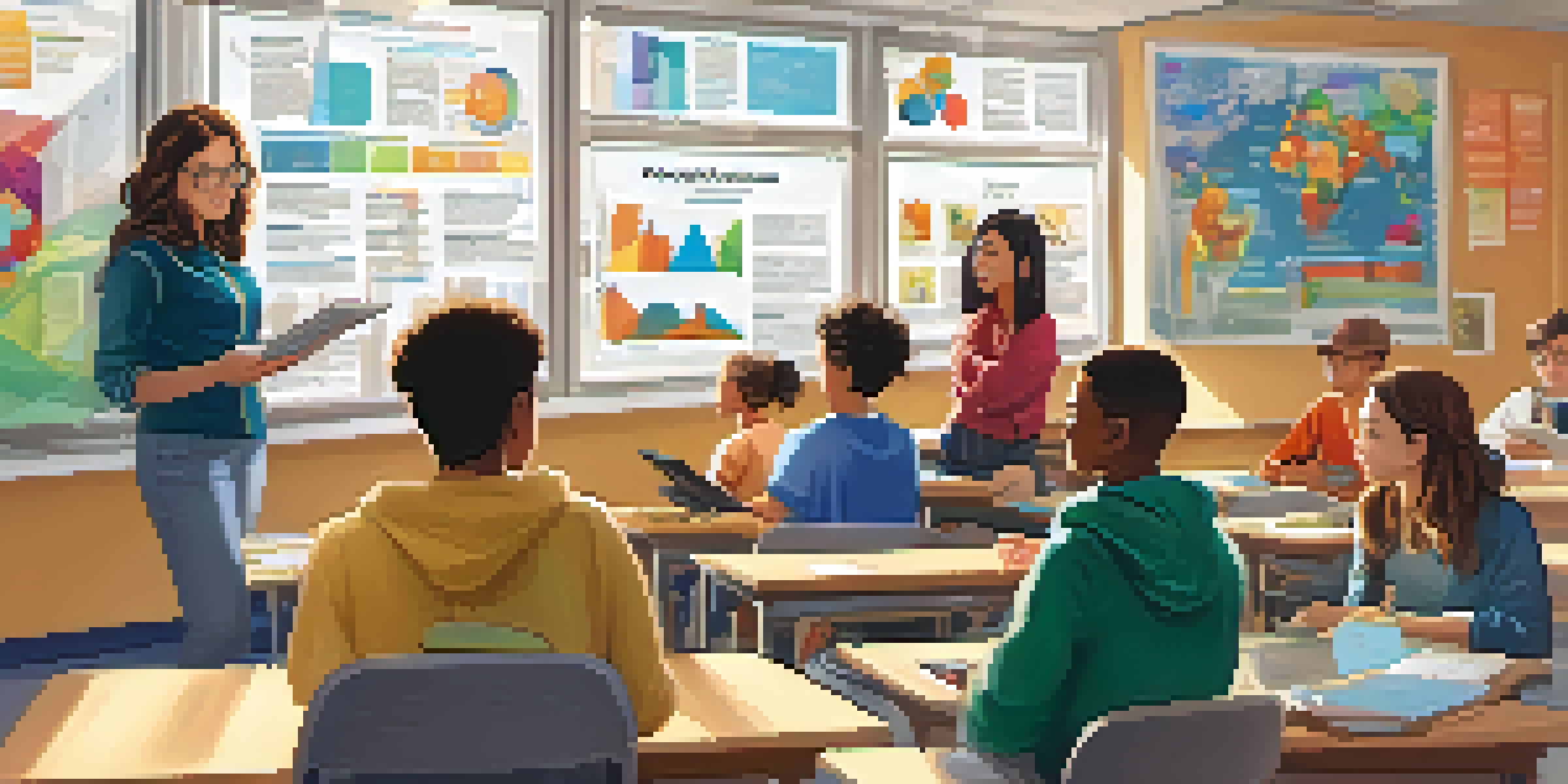The Role of Critical Media Literacy in Digital Citizenship

What is Critical Media Literacy and Why It Matters
Critical media literacy is the ability to access, analyze, evaluate, and create media in various forms. In today's digital landscape, where information is abundant and easily shared, this skill is more important than ever. It helps individuals discern credible sources from misinformation, fostering informed decision-making.
The media we consume has a profound impact on the way we view the world and ourselves.
Think of critical media literacy as a set of glasses that help you see the world more clearly. Without it, one might easily be misled by biased or false information that floods social media platforms. By honing this skill, you empower yourself to navigate the digital realm with confidence and discernment.
Moreover, critical media literacy goes beyond just understanding content; it encourages active engagement with media. This means not only consuming information but also creating and sharing it responsibly, which is a cornerstone of being a good digital citizen.
The Connection Between Media Literacy and Digital Citizenship
Digital citizenship refers to the responsible use of technology and the internet. It encompasses a range of behaviors, from online etiquette to understanding privacy. Critical media literacy plays a vital role in shaping these behaviors, enabling individuals to engage thoughtfully and ethically online.

For example, when someone encounters a viral post, critical media literacy helps them question its validity before sharing. This not only prevents the spread of misinformation but also contributes to a more informed online community. In essence, being media literate is a fundamental aspect of being a responsible digital citizen.
Critical Media Literacy Defined
Critical media literacy is essential for navigating today's digital landscape, helping individuals discern credible information from misinformation.
In a world where our online actions can have real-world consequences, understanding the interplay between media literacy and digital citizenship is crucial. It equips individuals with the tools needed to interact positively and constructively in the digital space.
Recognizing Misinformation and Bias in Media
One of the core components of critical media literacy is the ability to recognize misinformation and bias. Misinformation can come in many forms, from misleading headlines to manipulated images, and it can easily sway public opinion. By training ourselves to identify these elements, we become better consumers of information.
In an age of information overload, critical thinking is our greatest tool against misinformation.
Imagine walking through a crowded marketplace where some vendors are selling genuine products while others are peddling fakes. Critical media literacy helps you distinguish between the two, ensuring that you only engage with credible sources. This skill is essential for navigating the vast array of information available online.
Furthermore, understanding bias helps us appreciate different perspectives while also recognizing when information may be skewed. This awareness fosters a nuanced understanding of news and media, encouraging us to seek out multiple viewpoints before forming an opinion.
Empowering Youth Through Media Literacy Education
Educating young people about critical media literacy is essential for cultivating responsible digital citizens. Schools and parents can play a pivotal role by integrating media literacy into curricula and discussions. This equips youth with the skills necessary to navigate the digital landscape confidently.
For instance, classroom activities might involve analyzing news articles or creating digital content, which not only enhances critical thinking but also promotes creativity. Engaging students in discussions about media ownership and representation can further deepen their understanding of media's impact on society.
Youth Education is Essential
Empowering young people with media literacy skills is crucial for cultivating responsible digital citizens who can effectively engage with information.
By investing in media literacy education, we are preparing the next generation to tackle challenges related to misinformation and online behavior. Empowered with these skills, young individuals are more likely to become active, responsible participants in their communities.
The Role of Social Media in Critical Media Literacy
Social media platforms are powerful tools for communication and information sharing, but they also present challenges in terms of misinformation. Critical media literacy helps users navigate these platforms effectively, enabling them to evaluate the credibility of the content they encounter. Understanding how algorithms work can further enhance this skill.
Imagine scrolling through your social media feed, where posts are tailored to your interests but may not always reflect the truth. Critical media literacy equips users with the ability to question the sources of information, ensuring they engage with content that is accurate and trustworthy.
Moreover, social media can be a space for positive change when users apply critical media literacy. By sharing verified information and engaging constructively, individuals can contribute to a more informed and responsible online community.
Building Community Through Responsible Media Practices
Critical media literacy not only affects individual behavior but also has the potential to strengthen communities. When individuals prioritize responsible media consumption and sharing, they contribute to a culture of trust and accountability. This collective effort can significantly reduce the spread of misinformation.
Consider a neighborhood watch program, where members look out for each other’s safety. Similarly, a community that values critical media literacy watches out for reliable information, supporting one another in making informed choices. This creates a ripple effect, fostering a more engaged and proactive populace.
Community Strengthens Through Media
Responsible media practices foster community trust and accountability, leading to a more informed and proactive society.
In essence, by embracing responsible media practices, communities can cultivate environments where accurate information thrives. This ultimately leads to healthier discourse and stronger connections among community members.
The Future of Digital Citizenship and Media Literacy
As technology continues to evolve, so too does the need for critical media literacy in digital citizenship. Emerging trends, such as artificial intelligence and deepfakes, highlight the importance of staying informed and adaptable. Media literacy will play a crucial role in helping individuals navigate these advancements responsibly.
Imagine a world where misinformation is rampant due to advanced technology. Critical media literacy acts as a shield against such challenges, empowering individuals to question and verify the information they encounter. This adaptability is essential for maintaining a healthy digital environment.

Looking ahead, fostering a culture that prioritizes critical media literacy will be vital in shaping responsible digital citizens. By equipping ourselves and future generations with these skills, we can create a more informed and engaged society that thrives in the digital age.